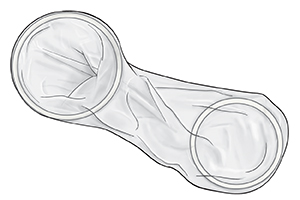Safer Sex Guidelines
What is safe sex?
Having sex with only one partner who only has sex with you when neither of you has a sexually transmitted infection (STI) is believed to be safe. But many health care professionals believe that the only way to be truly safe is not to have sex. All forms of sexual contact carry some risk.
For example, kissing is thought to be a safe activity. But herpes and other diseases can be spread this way.
Condoms are commonly thought to protect against STIs. It's true that condoms are useful in preventing certain diseases such as herpes, chlamydia, and gonorrhea. But they may not fully protect against other diseases, such as genital warts, syphilis, or HIV.
 |
| Préservatif masculin |
 |
| Préservatif féminin |
Guidelines for safer sex
The safest sex is to limit your sexual activity to only one partner who is having sex only with you. This will help to reduce exposure to disease-causing organisms. To increase your chance of having safer sex, follow these guidelines:
-
Before starting a sexual relationship with a new partner, it's important to have honest discussions. Be open about past partners, history of STIs, and drug use.
-
Use condoms every time you have sex. Choose a male condom made of latex or polyurethane, not one made of natural materials. Only use polyurethane if you are allergic to latex. Female condoms are made of polyurethane.
-
Studies say that nonoxynol-9 spermicide kills HIV in lab testing. But it's not known whether spermicides, used alone or with condoms, provide protection against HIV. There are data that show nonoxynol-9 may increase the risk of HIV transmission. But the CDC advises using latex condoms, with or without spermicides, to help prevent sexual transmission of HIV.
-
For oral sex, help protect your mouth by having your partner use a condom (male or female).
-
Be aware that drinking alcohol or using drugs may increase the chance that you'll participate in high-risk sexual behaviors.
-
People should not douche after intercourse. It does not protect against STIs. It could spread an infection farther into the reproductive tract, and can wash away spermicidal protection.
-
Have regular Pap tests, pelvic exams, and periodic tests for STIs.
-
Be aware of your partner's body. Look for signs of a sore, blister, rash, or discharge.
-
Check your body often for signs of a sore, blister, rash, or discharge.
-
Consider sexual activities other than vaginal, oral, or anal sex. There are ways to be intimate that don't involve the exchange of body fluids or contact between mucous membranes.
Online Medical Reviewer:
Heather M Trevino BSN RNC
Online Medical Reviewer:
Tennille Dozier RN BSN RDMS
Date Last Reviewed:
7/1/2025
© 2000-2026 The StayWell Company, LLC. All rights reserved. This information is not intended as a substitute for professional medical care. Always follow your healthcare professional's instructions.